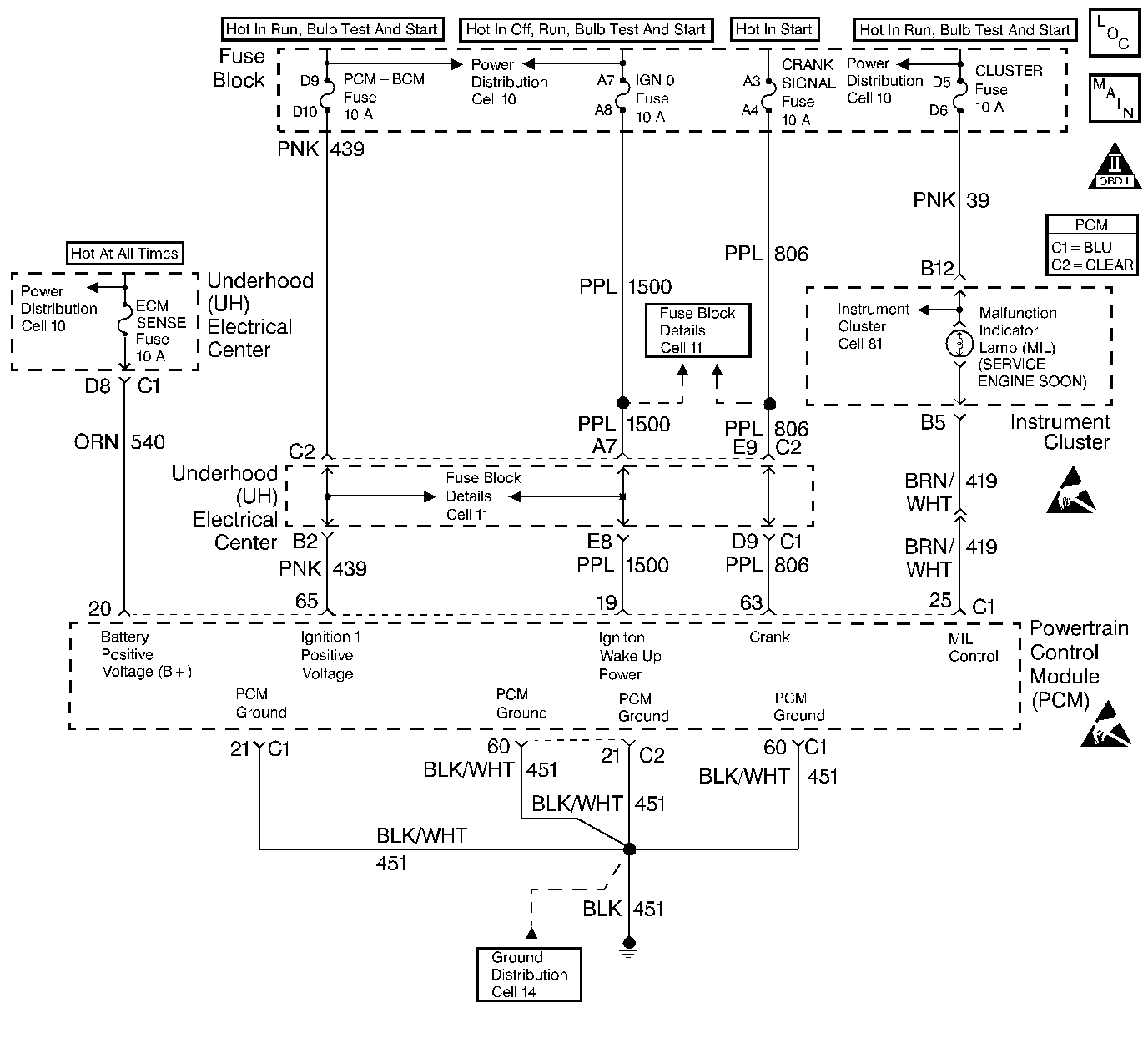
Circuit Description
There should always be a steady MIL with the ignition on and the engine stopped. Ignition feed voltage is supplied directly to the MIL bulb. The Powertrain Control Module (PCM) turns the MIL on by grounding the MIL driver circuit. No MIL with the key on, engine not running and DTC P1641 set suggests an open in the MIL driver circuit.
MIL Operation
The Malfunction Indicator Lamp (MIL) is located on the instrument panel (CHECK ENGINE) or (SERVICE ENGINE SOON). The MIL performs the following functions:
| • | It informs the driver that a problem has occurred and that the vehicle should be taken for service as soon as possible. |
| • | As a bulb check and system check, the MIL will illuminate with the ignition switch ON and the engine not running. when the engine is started, the MIL will turn OFF. If the MIL remains ON, the self-diagnostic system has detected a problem. If the problem goes away, the MIL will turn OFF in most cases, but a diagnostic trouble code will remain stored. |
| • | If the MIL is illuminated, then the engine stalls, the MIL will remain Illuminated so long as the ignition switch is ON. |
| • | Now, if the MIL is not illuminated and the engine stalls, the MIL will not illuminate until the ignition switch is cycled OFF, then ON. |
Perform the Powertrain On-Board Diagnostic System Check first, when the following conditions are present:
| • | When the MIL does not turn ON when the the ignition switch is turned to the RUN position |
| • | When the MIL remains ON while the engine is running |
| • | When you suspect a driveability problem |
| • | When you suspect an emissions problem |
Diagnostic Aids
An intermittent may be caused by a poor connection, rubbed through wire insulation or a wire broken inside the insulation. Check for the following items:
| • | Inspect the PCM harness and connectors for improper mating, broken locks, improperly formed or damaged terminals, poor terminal to wire connection, and damaged harness. |
| • | If the engine runs OK, check for a faulty light bulb, an open in the MIL driver circuit, or an open in the instrument cluster ignition feed. |
| • | If the engine cranks but will not run, check for an open PCM ignition or battery feed or a poor PCM to engine ground. |
Test Description
The numbers below refer to the step numbers on the Diagnostic Table:
-
A no MIL condition accompanied by a no start condition suggests a faulty PCM ignition feed or battery feed circuit.
-
Using a test light connected to battery positive voltage, probe each of the PCM ground terminals to ensure that a good ground is present. Refer to PCM Terminal End View for terminal locations of the PCM ground circuits.
-
This vehicle is equipped with a PCM which utilizes an Electrically Erasable Programmable Read Only Memory (EEPROM). When the PCM is being replaced, the new PCM must be programmed. Refer to Powertrain Control Module Replacement/Programming .
Step | Action | Value(s) | Yes | No |
|---|---|---|---|---|
1 | Was the Powertrain On Board Diagnostic (OBD) System Check performed? | -- | ||
Attempt to start the engine. Does the engine start? | -- | |||
3 | Check the fuse for the instrument cluster ignition feed circuit. Is the fuse OK? | -- | ||
4 | Turn the ignition on, probe the ignition feed circuit at the cluster connector with a test light to ground. Is the test light on? | -- | ||
5 |
Is the MIL on? | -- | ||
6 | Check the ignition wake up, PCM ignition feed and battery feed fuses. Are all of the fuses OK? | -- | ||
7 |
Is the test light on? | -- | ||
8 | Probe the battery feed circuit at the PCM harness connector with a test light to ground. Is the test light on? | -- | ||
Was a problem found? | -- | |||
10 |
Was a problem found? | -- | ||
11 |
Was a problem found? | -- | ||
12 | Repair open in the ignition feed circuit to the instrument cluster. Refer to Fuse Block Details in Electrical Diagnosis. Is the action complete? | -- | -- | |
13 | Locate and repair open in PCM battery feed circuit or PCM ignition feed circuit as necessary. Refer to Fuse Block Details in Electrical Diagnosis. Is the action complete? | -- | -- | |
14 | Locate and repair short to ground in ignition wake up circuit, or the PCM ignition feed circuit or the PCM battery feed circuit as necessary. Refer to Fuse Block Details in Electrical Diagnosis. Is the action complete? | -- | -- | |
15 | Locate and repair short to ground in the instrument cluster ignition feed circuit. Refer to Repair Procedures in Electrical Diagnosis. Is the action complete? | -- | -- | |
Replace the PCM. Important: : Replacement PCM must be programmed. Refer to Powertrain Control Module Replacement/Programming . Is the action complete? | -- | -- | ||
17 |
Was a problem found? | -- | Go to Instrument Panel in Electrical Diagnosis |
